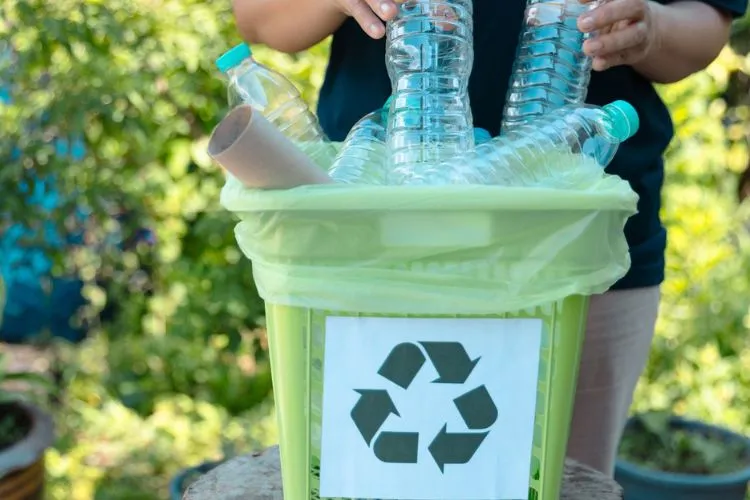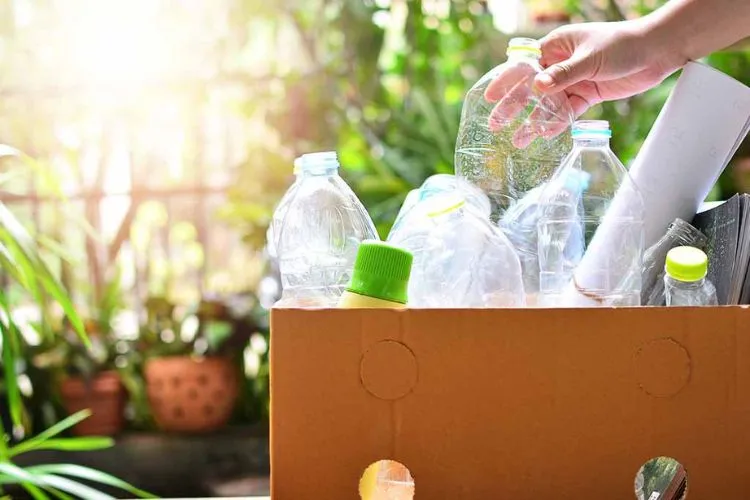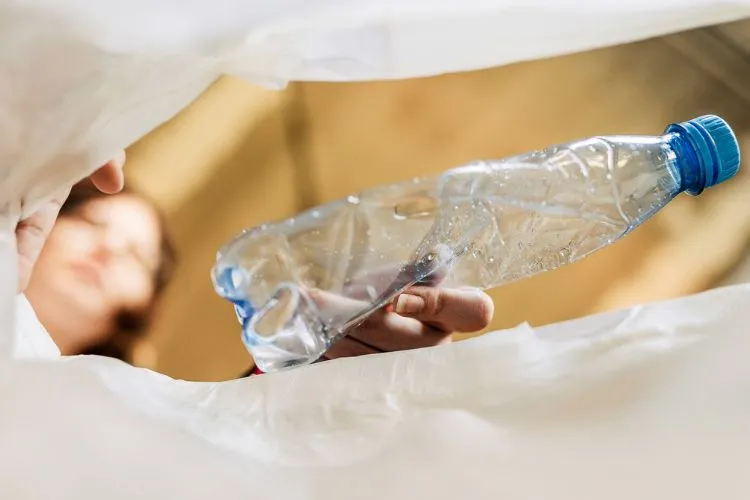Every year, billions of plastic bottles are produced and consumed worldwide, resulting in a significant waste challenge.
Only a fraction of these bottles are recycled. The rest add to the growing problem of plastic pollution in our environment.
In this article I will help you learn how to recycle water bottles in an easy to understand manner.
Recycling water bottles is a simple yet powerful act to combat this issue. This guide will provide you with all the necessary steps to recycle water bottles and contribute to a cleaner planet.

💦 The Importance of Recycling Water Bottles
Plastic water bottles can take up to 450 years to decompose. Their presence in landfills and oceans wreaks havoc on ecosystems. Recycling helps to minimize this damage.
By turning old bottles into new products, we conserve natural resources and reduce the demand for new plastic. The energy savings are notable too. Manufacturing goods from recycled materials consumes less energy compared to producing them from new.
💦 Types of Plastic Water Bottles
Most water bottles are made from PET or HDPE. These plastics are popular because they are lightweight and strong. They are also recyclable.
You can identify recyclable bottles by the recycling symbol. It is a triangle made of arrows with a number inside. PET bottles are marked with a “1”, while HDPE bottles have a “2”.
💦 Preparing Water Bottles for Recycling

Before recycling water bottles, ensure they are empty, clean, and dry. It prevents contamination, which can make the plastic unsuitable for recycling. Bottle caps and labels often have different recycling requirements than the bottle itself.
Check to see what your local facility prefers regarding caps. Once clean and dry, crush the bottles to save space in your recycling bin and make transportation more efficient.
💦 How to Recycle Water Bottles?
Recycling facilities accept water bottles in different ways. Curbside programs are convenient.
They allow you to leave your recyclables outside your home for collection. If your area doesn’t offer such a service, look for local recycling centers.
Some states have bottle deposit laws. They let you return bottles for a small refund. This incentive boosts recycling rates.
💦 Creative Ways to Reuse Water Bottles
Before tossing them in the recycling bin, consider upcycling water bottles. Home and garden projects can benefit from these materials.
Making a self-watering planter is one option. Creating a bird feeder is another.
For those who enjoy crafts, water bottles can become decorative items or storage solutions for small items.
💦 Challenges and Solutions in Recycling Water Bottles

One major issue in recycling water bottles is contamination. Non-recyclable materials in the bin can spoil the whole batch. Another challenge is low recycling rates.
Despite the benefits of recycling, many people still throw away plastics. We must tackle these issues by raising awareness and practicing proper recycling habits.
💦 Future of Recycling Water Bottles
Technological advancements promise improvements in recycling. Chemical recycling could change the way we process plastics. It breaks down plastic to its chemical components, making it easier to create new products.
On a global scale, initiatives to curb plastic waste are emerging. These efforts are vital as they pave the way for a more sustainable future.
💦 The Economics of Recycling: Costs and Benefits
The economics of recycling goes beyond environmental benefits; financially, it affects both the consumer and the industry. Recycling can lead to significant cost savings, particularly when considering the reduced need for raw materials.
Producing items from recycled materials often requires less energy than manufacturing from scratch, leading to lower production costs. For consumers, deposit return schemes offer financial incentives to recycle.
On a broader scale, recycling creates jobs in processing and sorting facilities. Additionally, properly managed recycling systems can reduce municipal waste management costs.
However, the efficiency of recycling programs and market demand for recycled materials greatly influence these economic benefits, necessitating continuous innovation and adaptation in recycling technologies and policies.
💦 Environmental Impact: Detailed Look at the Effects of Plastic Waste

The proliferation of plastic waste poses severe threats to ecosystems around the globe. Discarded plastic, which is not biodegradable, can linger in the environment for centuries, breaking down into microplastics that infiltrate soil and waterways.
Aquatic life is particularly imperiled, with animals mistaking plastic for food, leading to ingestion, entanglement, and often fatal consequences. Plastic particles can also absorb and transport harmful pollutants.
On land, plastic waste disrupts habitats, and as it degrades, it releases toxic chemicals that can affect soil composition and health. The environmental impact is a complex web of disruption, highlighting the urgency for effective waste management and reduction strategies.
frequently asked questions (FAQs)
Can all plastic water bottles be recycled?
Most can be, but it’s best to check local guidelines. Not all recycling programs accept the same types of plastic.
Why should you remove caps and labels before recycling?
Some recycling processes require it. Removing them can help ensure the plastic is properly recycled.
What happens to water bottles after they are recycled?
They’re often turned into new plastic products, like fibers for clothing or new containers.
How can I recycle water bottles if there’s no curbside recycling available?
Look for local drop-off locations or community programs. Some areas offer frequent collection events.
Is it better to reuse or recycle a water bottle?
Reusing is always preferred, but when that’s no longer feasible, recycling is the next best option.
Conclusion:
The state of our planet urges us to take action. Recycling water bottles is a step we can all take. This guide has shown you how to do it right.
It’s time we make a difference. Let’s recycle responsibly and encourage others to do the same.
Recycling is just one part of the solution. Reducing our reliance on plastic water bottles is essential. Opting for reusable alternatives can dramatically cut down on waste.
Join a community clean-up to help clear our natural spaces of plastic pollution. Every small action adds up to significant changes.

Devon Shorts, a seasoned expert with over a decade of experience in water safety, shares valuable insights on this blog “Aqua Safety Plus”. Trust his expertise to keep your water clean and your family safe.
